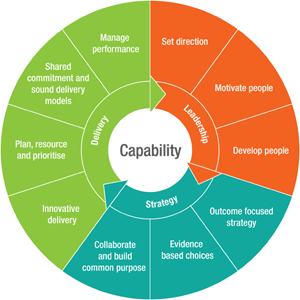Capability review: Department of Resources, Energy and Tourism
Foreword
The 2010 report Ahead of the Game: Blueprint for the Reform of Australian Government Administration recommended that the Australian Public Service Commission (APSC) undertake reviews to assess capability in key agencies and to identify opportunities to raise the institutional capability of the service as a whole.
The methodology used by the APSC to conduct these reviews has been gradually refined to more closely reflect the Australian context in which the review program is being conducted.
On the occasion of this review, I would like to thank the department for its professional and enthusiastic participation. All staff who participated in interviews and workshops were generous with their time and displayed great passion for their work.
I would also like to thank Mr Graham Evans AO, the chair of the review team, other senior members of the team, Ms Rachel Hunter, Ms Rona Mellor, and my own team from the APSC who supported and advised them. Once again, this review has demonstrated the advantages of bringing together a team of this calibre.
Steve Sedgwick
AO
Australian Public Service Commission
Context
The Department of Resources, Energy and Tourism (RET) provides advice and stewardship on policies and programs which contribute significantly to the Australian economy and to the nation's wealth and wellbeing. In 2011–12, the resources, energy and tourism sectors accounted for more than 15% of Australia's gross domestic product, more than 60% of Australia's export earnings and 40% of Australia's energy use.1 The sectors will continue to be critical for continued economic prosperity into the future. They will be major drivers of export earnings, gross domestic product growth and, consequently, have major implications for budget revenue. These industries, together with the department, are front and centre of the dynamic policy challenges facing an economy in transition, where changing demands for energy and resources and a need to address the implications of climate change, present ongoing challenges.
In addition to the department's policy and program responsibilities for the resources, energy and tourism sectors, RET is responsible for providing advice to government on cross-cutting issues which have an impact on these industries, including but not limited to productivity and competitiveness, sustainability, taxation, industrial relations, immigration, land use, infrastructure development, Indigenous engagement, and international and federal relations.
The resources, energy and tourism portfolio was established following administrative arrangements orders issued in December 2007 and January 2008. Functions largely transferred from the former Department of Industry, Tourism and Resources, but also from the former departments of Education, Science and Training, and Environment and Water Resources. The Bureau of Resources and Energy Economics (BREE) transferred to the department in July 2011 from the Australian Bureau of Agricultural and Resource Economics located in the Department of Agriculture, Fisheries and Forestry. The Australian Renewable Energy Agency (ARENA).2 commenced operation in July 2012 with responsibility for administering committed projects and measures from initiatives formerly administered by the Australian Centre for Renewable Energy and RET.
The most recent change to the department's role and structure occurred in March 2013 when energy efficiency functions of the former Department of Climate Change and Energy Efficiency were transferred to the department.
In addition to machinery-of-government (MoG) changes, RET has experienced a number of changes in its senior leadership group. Since its inception in 2007, the department has had four Secretaries, with the most recent, Mr Blair Comley, appointed in March 2013. A second Deputy Secretary joined the senior executive in April 2013.
The review's mandate relates to the current RET structure and responsibilities. This report is therefore written and presented to provide the current Secretary with a forward looking, high-level capability assessment of RET as it currently exists.
However, given the proximity to the federal election in September 2013, and the past history of MoG changes to the department's functions and responsibilities, the review team has considered the possibility of further changes to the department and the continued relevance of the review findings.
Given the review's focus on the high-level organisational capabilities of leadership, strategy and delivery, the review team considers that its findings are equally relevant across the department. The review team believes the future objectives, challenges, and enabling requirements needed to build capability will remain relevant to the resources, energy and tourism policy areas and programs regardless of their departmental location.
1 About the review
A capability review is a forward-looking, whole-of-agency review that assesses an agency's ability to meet future objectives and challenges.
This review focuses on leadership, strategy and delivery capabilities in RET. It highlights the department's internal management strengths and areas for development using the model set out in Figure 1. A set of 39 questions is used to guide the assessment of each of the 10 elements of the model. Those assessments are included in Section 4 of this report.
Capability reviews are designed to be relatively short and take a high-level view of the department's strategic operations. They focus primarily on its senior leadership, but are informed by the views of its middle management, who attend a series of workshops.
External stakeholders are also interviewed, including relevant ministers, private sector companies, state delivery organisations, peak bodies, interest groups, citizens, clients and central agencies.
The fieldwork for the capability review of RET was undertaken between 1 July and 6 September 2013.

Figure 1 – Model of capability
1 RET Annual Report 2011–12, Introduction
2 ARENA draws resources from RET but operates as an independent statutory body. ARENA was considered a stakeholder for the purposes of this review.



